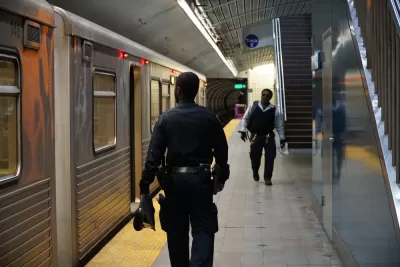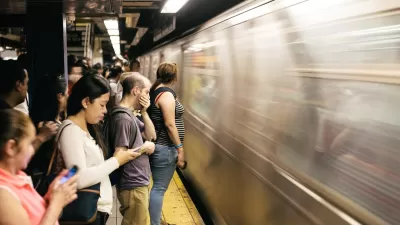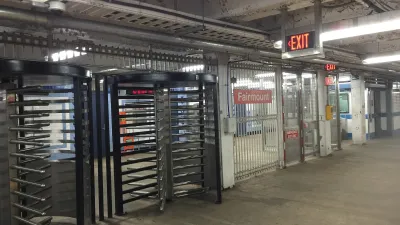Some transit agencies are launching ‘ambassador’ programs that use unarmed personnel to respond to safety concerns and reduce interactions with armed law enforcement.

Advocates have long called for a decrease in armed police presence on public transit, citing research showing that a police presence doesn’t necessarily contribute to a safer environment and discourages ridership. Now, transit agencies are starting to shift their approach when it comes to transit security, writes Henry Pan in Next City.
“Last year, BART Police began to pilot its Transit Ambassadors program, using uniformed but unarmed personnel to respond to riders facing homelessness, mental health emergencies, drug overdoses and other crises.” For now, these ambassadors are still accompanied by police officers, but BART’s Chief Communications Officer Alicia Trost says “The idea is to really reimagine safety and to meet the needs of all types of riders, but especially marginalized communities who are often not listened to, or or often aren’t given resources based on their needs.”
According to Pan, “Deploying ambassadors seems to be working. During the pilot period between February and August of 2020, ambassadors called police to resolve less than 1% of the over 14,000 interactions they have with riders. Reports on sexual harassment, sexual assault and lewd behavior sent by riders through their BART Watch app are also decreasing, from 2% in 2019 to less than 1% so far this year.”
Similarly, “The Massachusetts Bay Transportation Authority has an ambassador program that relies on contractors, with the Los Angeles County Metropolitan Transportation Authority to follow next month. Metro Transit’s Police Department in the Twin Cities created a Homeless Action Team in 2018 that connected over 400 formerly unhoused people who ride the system for shelter to public housing managed by its parent agency, the Metropolitan Council.”
For now, BART plans to stick with police officers alongside the new ambassadors, citing the potential need for an armed response in the event of a major incident.
FULL STORY: Transit Agencies Try Decarceral Approaches to Improve Rider Safety

Maui's Vacation Rental Debate Turns Ugly
Verbal attacks, misinformation campaigns and fistfights plague a high-stakes debate to convert thousands of vacation rentals into long-term housing.

Planetizen Federal Action Tracker
A weekly monitor of how Trump’s orders and actions are impacting planners and planning in America.

In Urban Planning, AI Prompting Could be the New Design Thinking
Creativity has long been key to great urban design. What if we see AI as our new creative partner?

King County Supportive Housing Program Offers Hope for Unhoused Residents
The county is taking a ‘Housing First’ approach that prioritizes getting people into housing, then offering wraparound supportive services.

Researchers Use AI to Get Clearer Picture of US Housing
Analysts are using artificial intelligence to supercharge their research by allowing them to comb through data faster. Though these AI tools can be error prone, they save time and housing researchers are optimistic about the future.

Making Shared Micromobility More Inclusive
Cities and shared mobility system operators can do more to include people with disabilities in planning and operations, per a new report.
Urban Design for Planners 1: Software Tools
This six-course series explores essential urban design concepts using open source software and equips planners with the tools they need to participate fully in the urban design process.
Planning for Universal Design
Learn the tools for implementing Universal Design in planning regulations.
planning NEXT
Appalachian Highlands Housing Partners
Mpact (founded as Rail~Volution)
City of Camden Redevelopment Agency
City of Astoria
City of Portland
City of Laramie





























